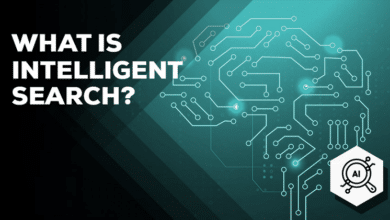What Is Intelligent Search?

In the swiftly evolving landscape of information retrieval and data processing, intelligent search stands out as a revolutionary step forward. This specialized form of search technology leverages artificial intelligence (AI) and machine learning to provide more relevant, contextual results for users. It interprets and understands the nuances of human language, anticipates needs based on behavior, and learns from interactions to deliver a personalized search experience. As we delve deeper into the capabilities and advantages of intelligent search, we’ll explore how it’s changing the way we access information. Keep reading to uncover the intricacies and future developments of this transformative technology.
The Impact of Intelligent Search on User Experience and Business Outcomes
Alt text: A woman stands by a sunlit window, basking in the warm glow of sunlight streaming through the glass.
Intelligent search enhances the user experience by delivering fast, accurate, and relevant results, boosting both productivity and satisfaction. Users now expect personalized, intuitive technology, which raises the bar for interactive platforms. For businesses, intelligent search improves workflows by helping employees access information quickly, leading to better decision-making and increased efficiency.
On the customer side, intelligent search offers more personalized recommendations and relevant content, which can improve engagement and loyalty. The insights gained from search trends can inform marketing, product development, and customer service strategies, making intelligent search a key tool for business growth.
Understanding Intelligent Search and Its Evolution in Technology
Intelligent search is a technology that focuses on providing precise information in an instant, transforming traditional keyword-based searches into a more personalized experience. It has evolved from basic algorithms to sophisticated systems that understand user preferences and context. Intelligent search systems benefit from exponential data growth and processing power advancements, digesting diverse data like text, images, and voice.
Natural language processing (NLP) technologies have bolstered this evolution, allowing computers to interpret and generate meaningful human language, enabling intelligent search systems to understand complex queries and discern intent. AI improvements have further accelerated the growth of intelligent search, enabling systems to learn from past searches and user behavior, leading to more targeted search results.
The Mechanisms Behind Intelligent Search: AI and Machine Learning at Work
Intelligent search is a technology that uses artificial intelligence and machine learning algorithms to understand and predict user information. These algorithms, such as neural networks, analyze user interactions and feedback to adjust search outcomes. They process large datasets, recognizing trends and relationships to present relevant information first.
AI also allows search systems to recognize images and speech, expanding beyond traditional text-based queries. This makes the technology more inclusive and versatile. Intelligent search is not complete; it requires continuous learning and adaptation to maintain relevance in the digital world. The algorithms will continue to refine themselves based on growing data and user behavior.
Key Features That Distinguish Intelligent Search from Traditional Search Engines
Alt text: A woman walks through a bustling city at night, surrounded by glowing lights and the dynamic atmosphere of urban life through intelligent search.
Intelligent search systems are distinct from traditional search engines due to their semantic understanding, which goes beyond keyword matching to interpret the meaning behind words. These systems provide relevant results to inputted terms and implied contexts. They also offer personalized results that adapt to user preferences and behavior, ensuring a tailored experience.
Real-time indexing is crucial in dynamic environments, ensuring the latest insights are readily available. Intelligent search platforms offer sophisticated query refinement tools that help users narrow down results through filters and smart suggestions, improving the efficacy and user-friendliness of intelligent search.
Future Trends in Intelligent Search: Predictive Analytics and Personalization
Intelligent search technology is set to revolutionize information interaction by offering personalized and anticipatory experiences based on user behavior patterns, interests, and tasks. The integration of AI technologies like deep learning will enable more nuanced understanding, providing a holistic search experience. Personalization will deepen, learning an individual’s language use, preferred sources, and intent behind repeated queries.
The rise of IoT and wearable technologies will further embed intelligent search into daily lives, allowing context-aware assistance. As more devices become search-enabled, intelligent search will become an integral part of a connected lifestyle, blending seamlessly into our physical and digital worlds.
Overall, intelligent search represents a paradigm shift in our relationship with technology. It empowers users with accurate, efficient, and personalized access to the world’s knowledge at their fingertips. As we move forward, the continued improvements in AI and machine learning will undoubtedly keep pushing the boundaries of what’s possible. Endeavors in intelligent search will not only enhance our ability to find information but will also redefine how we learn, work, and interact with the digital universe around us.




